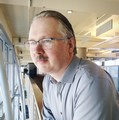Across Canada Workshop Series on Resilient Rainwater Management included a session for the Toronto region: "The workshop provided an opportunity to bring together those who are ‘influencers’ in stormwater management," said Glenn MacMillan of the host TRCA

“We anticipated that the workshop program would be good. In fact, it exceeded expectations. One technical area in which the BC team had an impact was the way in which they drew audience attention to the fundamental importance of soil-water interaction; and how an understanding of this relationship holds the key to implementing water balance solutions,” stated Glenn MacMillan.










